As Mumbai readies to host a zero wastage food festival next weekend, we gain entry into restaurant kitchens to learn what they do with leftovers
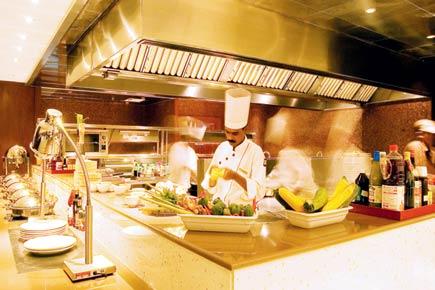
Over the next weekend, if you're at Lower Parel's High Street Phoenix, you'll be forgiven for believing that you're acting in Honey, I Shrunk The Kids. You'll spot sliders instead of chunky burgers, mini quiches replacing the buffed variety, and shawarmas slimmed into pita pockets. 35 food stations (the likes of Ellipsis bakery, Pita Burg, Havana Café and Bar and Greko) will dish out bite-sized treats as part of the Itsy Bitsy Food Festival, touted as India's first Zero Wastage Festival.
ADVERTISEMENT
 The daily leftovers from the bakery section at Churchgate's Gaylord are offered to a charity in Colaba the next morning
The daily leftovers from the bakery section at Churchgate's Gaylord are offered to a charity in Colaba the next morning
“Be it a big food festival or a niche event, brands often procure large orders because they don't want to run out of food. Creating smaller portions will help keep this in check and maximise their produce. Meanwhile, a foodie's experience is enhanced because they will get to try more options,” shares Ashwin Choithramani, events and creative head of Paprika Idealabs, organisers of the fest, who have also planned to donate each day's leftovers to charity organisations like Robin Hood Army and Roti Bank.
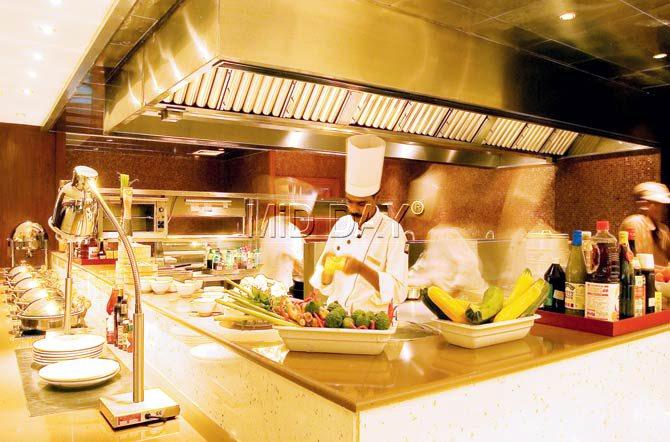
The buffet spread at Asian Kitchen, Four Points By Sheraton Navi Mumbai also includes a live station to curb wastage
However, the fest isn't the only one planning to curb food wastage. In a city that's reportedly home to 20,000 restaurants (and counting) in an industry worth over '57,000 crore, food wastage is a growing concern. “On an average, three to five per cent of food is wasted at a restaurant everyday. It can't be stopped completely but it can be controlled,” suggests Jasmit Tibb, CEO of Tibb's Frankie. At his QSR chain, the stock is bought daily, based on predicted sales.
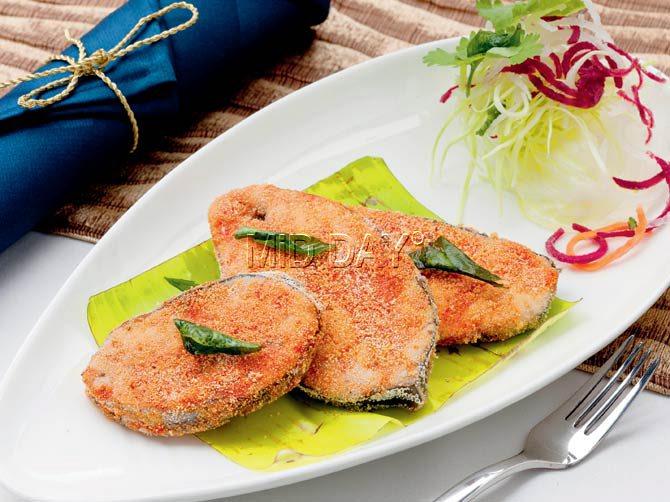 Rawa Crusted Surmai made with fish fillet at The Captain's Table
Rawa Crusted Surmai made with fish fillet at The Captain's Table
That's a standard practice followed traditionally too, agrees Noel D'Souza, general manager of Churchgate's iconic Gaylord fine dine restaurant. Till the early 1990s, every night after the kitchen closed, two staffers would conduct a five-hour long audit to understand consumption patterns, based on KOT (Kitchen Order Token). “It was tedious but that helped gauge the amount of produce that would be required the next day. Today, computer softwares make it easier. We also follow the FIFO (First In First Out) method. For instance, we order 10 per cent in addition to the required stock and if that is leftover, it is added to the running stock the next day,” says D'Souza. Meanwhile, the leftovers from the bakery are stored overnight and picked up by Colaba-based Prem Dan NGO the following day.
Catch 'em fresh
According to Tibb, dairy and seafood items are considered highly perishable, and hence, susceptible to wastage. Aarathi Arambhan, curator at MeSoHappi and The Captain's Table, offers a solution, “We order fillet of fish and boneless chicken instead of the whole fish or chicken, and based on the ingredient stock, add daily and weekly specials to the menu. Our maximum wastage would be 0.25 to 0.75 per cent of the sale.” Even the 50-year-old establishment, Trishna at Fort, buys fresh catch based on table reservations. “We don't have a cold storage facility; just a simple fridge. So, on an average, we source 50 fish that are sold out by end of day,” shares the manager, Taranath S Kuckian.
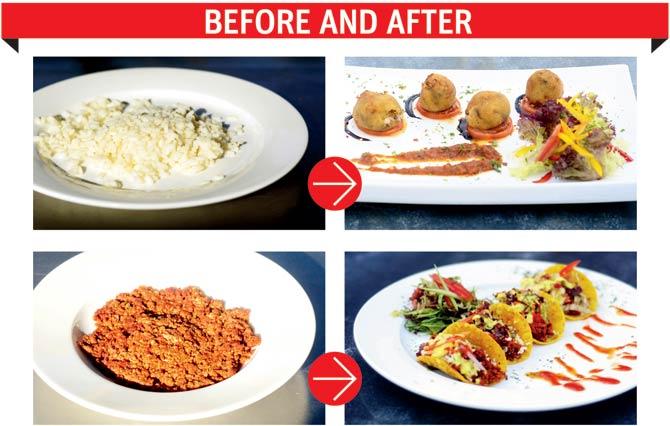
Meanwhile, if you happen to step into any of the Lemon Leaf outposts after 10 pm, there's very little chance that you will be able to tuck into their signature Thai Style Pomfret or King Prawns. “We might run out of fresh seafood every night since we order limited quantities, but I'd rather not serve stale food,” believes Mitesh Rangras of Sid Hospitality that also owns Pot Pourri and Soy Street.
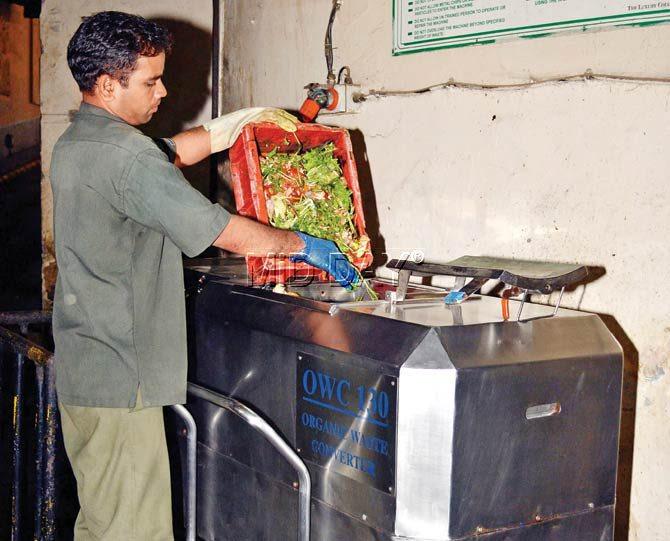 A staffer adds the daily waste to the Organic Waste Converter facility at ITC Grand Central, Parel. Pic/Datta Kumbhar
A staffer adds the daily waste to the Organic Waste Converter facility at ITC Grand Central, Parel. Pic/Datta Kumbhar
Recycle and reuse
These days, chefs are also doffing their creative hats to curb waste. During one of her kitchen experiments, chef Kshama Prabhu of The Bar Stock Exchange decided to make Mushroom Arancini Balls out of the leftover risotto and added it on the menu as the day's special. It turned out to be a bestseller. Now, it's earned a permanent place on the regular menu. The same goes for Lamb Kheema Tacos whipped up from mutton kheema. “In our restaurants, approximately, six portions of red meat items are leftover, so we either plan a special menu around it, add it as a special for the next day, or use it in the midnight meals for the staff. Even at home, don't we recycle our leftover idli, chapatis or rice?” retorts co-owner Mihir Desai of Corum Hospitality.
Portion control
Several city joints, especially those offering Indian cuisine, are now dishing out pre-plated meals or limited portions. For instance, at the SoBo all-veg state speciality restaurant, 29, the Bhuna Kofta Curry appears on the table with two Kerala Parottas while the Veg Xacuti and Goan Dali Thoy comes with a bowl of Coriander Steamed Rice. “We serve portions sufficient for two people. In case, it's unconsumed, we encourage patrons to take it along,” says owner Nishek Jain. At the Punjab Grill chain of restaurants, dishes are prepped based on ordering patterns. “We are low on orders on Monday but Saturday is jam-packed. So, we cook accordingly,” shares chef Gurpreet Singh.
Bash the buffet
Hotel buffets and banquets are a key problem area. “Any buffet-only establishment has a possibility of wastage because the cooked food cannot be consumed,” observes Rangras. Desai adds, “Banquets work on the basis of the number of people expected. So, most of the times, there are leftovers.” Little surprise then that many buffet spreads are now setting up live stations. One such hotel is Four Points by Sheraton Navi Mumbai at Vashi. “In our buffet, we've introduced smaller portions and live cooking stations. Plus, we follow the batch cooking technique. In case of expensive items like meat, we cool them down instantly and use them for cold cuts and in salads sometimes. Fortunately, we have good storage equipment that helps us in making the food items last longer,” shares executive chef Ashwini Kumar.
Meanwhile, ITC Grand Central has installed an Organic Waste Converter (OWC) within its premises to tackle the problem. Introduced in 2007 (a technology that exists across the ITC Hotels), the machine converts all the waste from its restaurants, buffet and banquets into manure. “It is a 10-day process in which organic waste is treated in a batch size of 50 kilo each. The machine operates on the principle of mechanical fluidisation of organic waste, which rotates inside the cylindrical mixing chamber,” informs the chief engineer, Ravindra Singh. Here, you can also avail of Single Diner menus, One Bite Wonders with downsized snack portions, as well as WelcomMeal, a bespoke meal created for in-room diners.
Celebrate the waste
American Express Bakery's wholesale setup sells breads to 15 hotels and institutions daily. “We don't believe in bulk production, so we call them up every morning to know the order. At our retail outlets, we usually prepare only the bestsellers like wholewheat and multigrain breads on a daily basis and keep the specialty breads (sun-dried tomato and olive, honey and oatmeal, etc) on a rotation,” says co-owner Yvan Carvalho.
In 1941, when restaurateur Muddanna Shetty established Ankur, one of the oldest restaurants in Fort, his main advice was to ensure minimum wastage. It's followed till date by his grandson, chef Toshin of Toshin Chocolatier Patisserie. He says, “We analyse the demand before starting production. At times, there are leftovers and as we are associated with the Ivy Restaurant, which has a big team, we pack the desserts that they can enjoy with their families. Sometimes, we even make up an occasion to celebrate.”
 Subscribe today by clicking the link and stay updated with the latest news!" Click here!
Subscribe today by clicking the link and stay updated with the latest news!" Click here!






